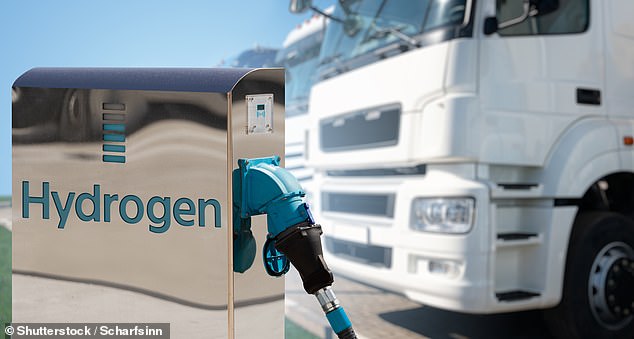Table of Contents
If they wanted to go greener, more than half of households would prefer to switch to hydrogen energy than purchase a heat pump, according to a recent survey.
But how does hydrogen heating work, when will it arrive and what does it mean for energy bills?
The UK is undergoing a radical change in the way we heat homes and power gas appliances. This is due to the Government’s net zero campaign, which aims to limit greenhouse gas emissions.
A large part of this campaign is to replace the use of natural gas, which reaches more than 80 per cent of UK homes.
Ring the bell: The nation loves gas boilers, but could there be a change on the horizon that will still allow households to keep a system they are familiar with?
The main alternative to gas boilers is the heat pump, which uses electricity to extract energy from the environment and convert it into heat.
But the Government’s program to get UK homes to install heat pumps is going slower than expected – only 55,000 will be installed in 2023.
Only one in ten people have a heat pump or want one, according to a YouGov survey commissioned by trade body Energy and Utilities Alliance.
But more than half (51 percent) of them said they would support blending natural gas with hydrogen to reduce carbon emissions from home heating. Hydrogen can be burned much like natural gas.
Meanwhile, two-thirds (66 per cent) of people want their current gas boilers converted for future use with a zero-carbon gas such as hydrogen.
So with all the consumer demand for hydrogen energy, what possibilities are there and how does the system work?
What does hydrogen mean for central heating?
Hydrogen can be used to heat homes and power existing gas appliances such as cookers and hobs, unlike heat pumps which only provide heat.
Replacing natural gas with hydrogen has several advantages, but also disadvantages.
Burning hydrogen does not generate harmful emissions, unlike natural gas which releases carbon dioxide.
Households should not need to make any adjustments to their boilers, meters or pipes if hydrogen is mixed up to 20 percent with natural gas.

Easy solution: small levels of hydrogen can be mixed into the gas supply without the need to change the boiler.
A HyDeploy report found that meters were not affected by the introduction of one-fifth hydrogen into the gas supply.
In fact, all gas appliances manufactured since 1996 are tested with a 23 per cent hydrogen mixture before they can be sold in the UK, due to the Gas Appliances Directive.
Therefore, a small amount of hydrogen in the gas system would allow households to keep their gas boilers and cookers, and most would not need modifications.
At the moment, all gas boilers and cookers can safely burn a small amount of hydrogen, but this is limited to 0.1 per cent under gas safety laws.
Hydrogen levels above 20 percent will begin to require modifications to homes, such as changes to plumbing, stoves, boilers and meters.
Why don’t we already have hydrogen heating?
The technology is still young and the Government wants to ensure that any hydrogen deployment is done safely and with as few inconveniences as possible.
The Government was consulting on plans to start adding hydrogen to gas supplies from 2025, but has now delayed this until at least 2026. Instead, its focus will be on heat pumps.
Energy Efficiency Minister Martin Callanan said: “Heat pumps and heat networks will be the main way to reduce household emissions for the foreseeable future.”
Is it more expensive to heat and cook with hydrogen?
Hydrogen is the most common element in the world (and indeed in the known universe), so in theory it is freely available.
But extracting hydrogen and piping it into UK homes is an expensive and often difficult practice.
A major drawback is that the cost of deploying hydrogen could be more expensive than simply installing heat pumps.
A study by energy experts Cornwall Insight found that hydrogen would be almost twice as expensive to heat a home compared to using natural gas.
There are also some safety concerns with hydrogen. Gas is less safe than natural gas, although neither is perfectly safe.

Hydropower: Hydrogen can be distributed on roads and in businesses before reaching homes
Hydrogen is more explosive and more prone to leaks, as it is a smaller molecule than natural gas, so it can pass through smaller cracks.
A government consultation said older gas meters may also be unable to handle the increased volumes of gas caused by mixing hydrogen with natural gas and may need to be replaced.
Still, in some parts of the country you still can’t get hydrogen, because the gas pipes in your area are made of old iron, which becomes brittle in contact with hydrogen.
These old iron pipes will be replaced by 2030.
What would hydrogen energy mean for energy bills?
This would depend on how much hydrogen is introduced and how it is done.
Energy bills will most likely increase if hydrogen is introduced into the gas supply.
Household gas bills could rise by 11.2 percent if mixed with 20 percent hydrogen, according to a 2022 report by the German Fraunhofer institute.
However, this 11.2 per cent rise was criticized by energy trial HyDeploy, which said a 6 per cent rise was more likely in the UK.
But other costs could also affect households if hydrogen is introduced.
There could be a cost to households if their own home’s gas system cannot handle hydrogen, and this must be removed before natural gas can be burned.
The Government’s consultation on the issue said: “For example, there may be costs associated with demixing if users are unable to use mixed volumes of gas and need to demix hydrogen at the point of use.”
A mixture of hydrogen and natural gas will increase the total amount of gas used by homes, because hydrogen provides less energy per volume when burned.
For example, a mixture of 20 percent hydrogen and 80 percent natural gas provides about 86 percent of the energy obtained by simply burning natural gas.
Home energy meters record the volume of gas used, so if hydrogen is eventually introduced into the system, the meter readings will increase significantly.
Despite this, gas bills should not change due to the additional volume, as long as hydrogen costs the same as natural gas, something that is currently unknown.
This is because gas bills are calculated based on the total energy used by consumers, not volume.
Some links in this article may be affiliate links. If you click on them, we may earn a small commission. That helps us fund This Is Money and keep it free to use. We do not write articles to promote products. We do not allow any commercial relationship to affect our editorial independence.


